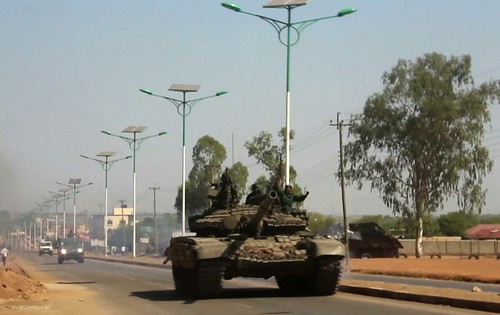
South Sudan tank during attempted coup on December 17, 2013. Reports indicate that more than 500 have been killed., a photo by Pan-African News Wire File Photos on Flickr.
WEDNESDAY 29 JANUARY 2014
South Sudan opposition parties consider forming single party ahead of 2015 elections
January 28, 2014 (JUBA) - At least thirteen South Sudanese political parties are discussing the possibility of forming a single party ahead the general elections schedule for 2015, an opposition figure said on Tuesday.
"We have been holding [a] series of serious discussions over the past months from which we came out with a consensus to emerge and form a single political party. What we are still discussing is the name of the party and who should be the flag bearer to contest the next general elections", said the member of the opposition who spoke on condition of anonymity.
South Sudan has several opposition parties but they have almost no political influence and power. The ruling Sudan People’s Liberation Movement (SPLM) - the political wing of the rebel movement that fought various Khartoum governments for over a decade until a 2005 peace deal paved the way for South Sudan’s secession from Sudan in 2011 - dominates the political landscape.
Although opposition parties are allowed, they are widely considered to having little chance of gaining political influence. There are presently more than 23 political parties, according to the registry with political parties’ council office, most of which do not have offices.
The SPLM is still not registered as a political party as it has failed to agree on its constitution and other vital documents as its national convention has been repeatedly delayed.
Tensions within the ruling party centre around at at least three senior figures who wished to challenge President Salva Kiir for the chairmanship of the party. The issues came to a head in a meeting on December 15 after which fighting broke out with the South Sudanese army, triggering the current conflict which has displaced over half a million people and killed some 10,000 people according to the International Crisis Group.
The second largest party, judging by the result of the 2010 general election, is the Sudan People’s Liberation Movement for Democratic Change (SPLM-DC) led by Lam Akol, which broke away from the SPLM in 2009. The SPLM-DC won five seats compared to the SPLM’s 160. Seven seats went to independents.
Other political parties include; The South Sudan Labour Party, United Democratic Front, South Sudan Democratic Forum, South Sudan Democratic Front, South Sudan African Party, Sudan African National Union, South Sudan Community Party, United Democratic Party, United South Sudan Party, United Democratic Salvation Front among others.
Opposition figures do not want to announce the names of the parties in the new coalition because they were still conducting consultations over the name of the new group and deciding on a leader who will be able attract voters.
Once identified, he said, the presidential candidate would contest the presidential election on behalf of the coalition parties. In the 2010 election the SPLM incumbent Salva Kiir won almost 93% of the vote. The SPLM-DC’s Lam Akol was his only challenger.
Since the peace deal in January 2005 and the death of the SPLM’s founder and chairman John Garang six months later, observers say that the former rebel movement has struggled to evolve into a political party within a democratic system and detach itself from its armed wing, the SPLA, which is now South Sudan’s national army.
"The death of John Garang has changed many things for our people and the country (South Sudan)," said Abraham Jok, native of Abyei, an oil-producing area that remains contested between Sudan and South Sudan.
"It has caused us to reflect on our journey over the last eight years on the progress we have made, and on the opportunities utilised and lost. We lost a great and visionary leader that the South, and indeed Africa, will take time to [re]produce", he said.
Analysts say the performance of President Salva Kiir’s administration has led to a draining of support from the SPLM because of a corruption, unemployment, failure to deliver basic services, and abuses at the hands of the police, army and security services.
Despite these factors the SPLM would still be favourites to win the 2015 elections due their legacy as the party that brought independence, funding and their dominance in South Sudanese media.
However, the political infighting that led to the catastrophic current conflict will mean that "some South Sudanese will be forced to forgive the SPLM many things," Daniel Garang, a political science student at Nkumba University in Kampala, Uganda, told Sudan Tribune.
Some observers say the SPLM will win the next election, but with a smaller majority.
The opposition, Garang said, will look to make inroads into the SPLM’s support in six states which constitute the Equatoria and Upper Nile regions.
He argues that "old political formations" and the legacy of liberation were becoming obsolete, and that many people in the SPLM already oppose South Sudan’s repressive system, regardless of their tribal and regional backgrounds.
The 2015 elections, the first since independence, are likely to be much tighter contest that in 2010.
(ST)
No comments:
Post a Comment